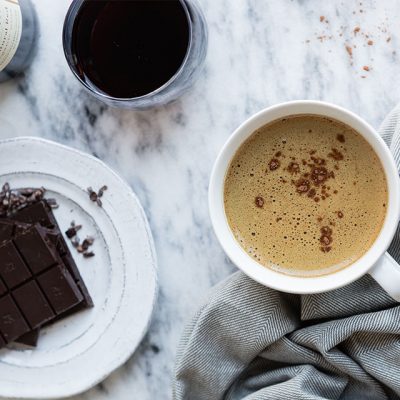Think of all the things you do every day: Sleep, eat, brush your teeth, like/share/comment on your favorite social media feeds. Here’s one indulgence you can add to your list:
Have a small piece of dark chocolate.
Besides being a healthy treat to satisfy a craving for sweets, dark chocolate—like red wine, grapes, berries, and even peanut butter—contains resveratrol, the compound that has been shown to have extraordinary benefits for our health and wellness.
You probably have heard of resveratrol (especially when people talk about the health benefits of red wine), so you may have some sort of idea that it has life-extending and energy-giving properties.
I first got into the science behind resveratrol in the land of buttery croissants. The French—who were known for their diets rich in saturated fats, wine, cheese, pastries, and other foods that weren’t traditionally thought of as “health foods”—were also known for having some of the healthiest cardiovascular systems in the westernized world. (This would be called the French Paradox.)
How could that be?
Science pointed to red wine—because of the resveratrol.
As it turns out, it was like resveratrol, found in grape skins, was one of nature’s most powerful cellular anti-aging medicines. It was like nature had already concocted an anti-aging compound, and it so happened that it could be delivered in some of our most delicious foods.
I believe that resveratrol is so powerful that it is something you should integrate into your daily life. Why? Because it has so many benefits. These are my five favorite superpowers of resveratrol.
Resveratrol: It’s a Gene Activator
So much of what controls aging is dictated by the choices you make (via food, nutrients, activity, sleep, and more). But it’s not just about the choices themselves. It’s about what effects those choices have on the orchestra of cellular systems that are chugging and churning every day.
Typically, when we turn 17 or 18—our bodies think we’re done growing—one of our longevity genes switches off. This gene, called sirtuin 1, can be activated via resveratrol. And that allows us to enjoy some youth-boosting benefits when the gene is turned on, including helping to prevent cellular damage that can occur over time.
Resveratrol: It’s an Inflammation Fighter
One of the biggest threats to our overall health: Inflammation. This happens as our body tries to fight damage caused on the inside. There are numerous ways that we can fight against inflammation, by preventing it from happening in the first place and from fighting the inflammation when it does happen.
Resveratrol is a polyphenol that not only protects our bodies as an antioxidant to help against damaging inflammation, but it also aids in activating autophagy; this is the body’s self-cleaning process that helps repair cellular damage. That’s why I like to call them powerphenols. Polyphenols protect and repair, which has an incredible anti-inflammatory effect all over our bodies.
Resveratrol: It’s a Brain Booster
Staying youthful isn’t just about how you look and how much energy you have. It’s about how you’re able to protect your most precious biological assets—against age, against damage, against the natural wear and tear that happens as part of living. And when it comes to precious assets, your brain certainly is at the top of the list.
Resveratrol has an amazing power as an antioxidant to cross the blood-brain barrier (this is a tricky thing to do because it exists for the very purpose of keeping things out). The effect is that resveratrol can help increase blood flow in the brain, reduce inflammation in the brain, and have other youth-enhancing properties. It even stimulates the growth and development of neurons and blood vessels, which is key to our well-being considering that unhealthy neurons are often tied to memory-related diseases.
Resveratrol: It’s a Heart Builder
Why was it called the French paradox? The “secret” to the French paradox comes from the strength that resveratrol can give to our entire cardiovascular system. There are thousands of studies done on resveratrol, and it all started around the research done to support resveratrol’s benefits for cardiovascular health. These studies show that resveratrol has the ability to decrease LDL (bad cholesterol) while increasing HDL (good cholesterol). This is important because it’s the cholesterol that plays a role in both the formation of plaque that can block arteries, as well as clear it (that’s what HDL helps do).
So part of having a strong cardiovascular system is about leveraging things that can help keep your blood vessels clear. That’s where resveratrol comes in. We now know that a glass of red wine is good for our health, but the problem is that you would have to drink about 500 glasses of red wine to see optimal benefits. That’s why supplements are more effective.
Resveratrol: It’s a Jolt for Your Joints
There are a lot of things that can make you feel older. This could be low energy and high fatigue. This could be weight gain. This could be lackluster skin. Another one on the list: Creaky, sore, or painful joints.
Your joints—made up of various soft tissue and fluid—is what essentially connects our bones to each other. They are what gives us mobility and stability, depending on the body part (knees are mobile compared to your hips, for example). Research shows that resveratrol can really strengthen our joints and support the cartilage. So, every day that you’re taking your resveratrol supplement, you’re doing something good for your joints and helping to reduce the effects of joint pain that can grow as you age.
To give my NAOMI Resveratrol 250 mg a try without risk, simply click here.





